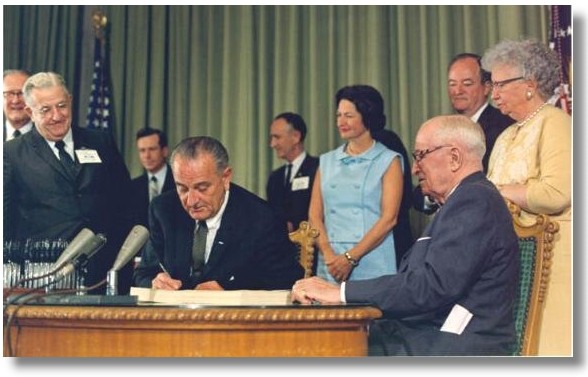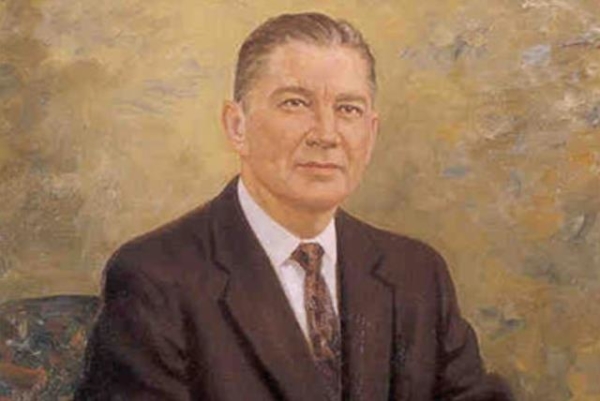
On this day in 1965, President Lyndon B. Johnson signed Medicare (and Medicaid) into law, providing hundreds of millions of Americans with health coverage over the ensuing decades. But it wasn’t an easy road to passage. It took a fervent belief in people’s right to affordable health care – even if they are older or poorer – along with a healthy dose of political will. Today, President Biden and Democrats in Congress are committed to expanding LBJ’s signature programs in what some have described as a new “Great Society.” Today’s seniors badly need vision, dental, and hearing coverage that traditional Medicare has never provided – and Democrats are poised to finally get it done. But it will take the same political will that the party mustered fifty-six years ago in enacting Medicare.
Many in Congress opposed Medicare from the start, labeling it “socialism” and “socialized medicine.” (Does that sound familiar?) In 1962, Ronald Reagan warned that if Medicare were to be enacted, “One of these days you and I are going to spend our sunset years telling our children, and our children’s children, what it once was like in America when men were free.”
In order to pass, Medicare first had to overcome some opposition from within the Democratic party. The powerful House and Ways Committee chairman, Wilbur Mills (D-AR), blocked consideration of Medicare legislation, despite widespread support for the program from many fellow Democrats. Only when Lyndon Johnson won a landslide victory in the 1964 presidential election, bringing an even bigger Democratic majority to the new Congress, did Mills relent and allow Medicare to move forward.

Powerful House Ways & Means Chairman Wilbur Mills was against Medicare before he was for it
Signing Medicare into law on July 30, 1965, President Johnson remarked:
“Through this new law, every citizen will be able, in his productive years when he is earning, to insure himself against the ravages of illness in his old age… We marvel not simply at the passage of this bill, but what we marvel at is that it took so many years to pass it.“ – President Lyndon B. Johnson
Today, President Biden and the Democrats do not have the enviable Congressional majorities the party enjoyed in 1965, making it more difficult to “go big” on expanding social programs through the normal legislative process. Most Republicans are no more likely to support Medicare expansion now than they were the program itself 56 years ago. For that reason, Democrats are planning to add dental, vision, and hearing coverage to Medicare as part of President Biden’s proposed $3.5 trillion spending plan through the budget reconciliation process, which could pass on a party-line vote in the Senate.
Opponents, predictably, have slammed the President’s spending plan using all-too-familiar rhetoric. Sen. John Barrasso (R-WY) called it “a freight train to Socialism.” And there are the usual GOP cries that expanding the programs that help everyday Americans will swell the debt, never mind that that the Trump/GOP tax cuts for the wealthy and big corporations added a $1.5 trillion torrent of red ink.
To enact Medicare expansion through the budget reconciliation process, Democrats will need all 50 Democratic senators to vote for the spending package. Sen. Joe Manchin (D-WV) has voiced tentative support for the $3.5 trillion proposal, while fellow moderate Sen. Kyrsten Sinema (D-AZ) announced this week she opposed the price tag as too large. If Democrats eventually coalesce around a lower, compromise spending amount, the provisions for expanding Medicare benefits may shrink accordingly. Any new dental, vision, and hearing benefits were likely to be modest in the first place, so seniors should rightly demand their Senators to unite around the most robust improvements possible.
The National Committee to Preserve Social Security and Medicare has long advocated to expand Medicare to meet the needs of today’s seniors:
“I know some members of Congress may consider hearing dental and vision benefits to be luxuries. But if you need to see a dentist, if you can’t see properly, if you can’t hear alarms, it’s not a luxury. It’s essential for the safety and health of older people.” – Max Richtman, president and CEO, National Committee to Preserve Social Security and Medicare, 7/27/21
This moment in history provides perhaps the best opportunity to expand Medicare in the past two decades. Democrats do not hold as much power on Capitol Hill as they did 56 years ago, but they must push to the finish line on Medicare expansion and overcome obstructionism. In short, they must channel the political will the party demonstrated in 1965 to achieve a long-held goal that improves the lives of generations of American seniors.


